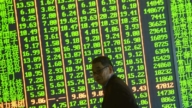【新唐人2012年7月16日訊】大陸的國家統計局7月13號發佈資料顯示,中國第二季度國內生產總值(GDP)較上年同期增長7.6%,創下2009年第一季度以來的最低水準。不過專家指出,中國的經濟實際上要比公布的嚴重得多,靠投資增長的模式已經走到了盡頭。
從7月9號國家統計局公布的月度經濟資料顯示, 6月份的全國工業生產者出廠價格(PPI)同比下降2.1%,實現連續四個月負增長,降幅不斷擴大。不僅如此,6月進口總額超預期的下滑。這反映出目前中國仍「需求疲軟」,下半年經濟增速或將繼續放緩。
雖然如此,仍有不少經濟學家懷疑中國實際情況比官方資料更為惡劣。
總部設於倫敦的研究機構「資本經濟」為了正確預測中國經濟增長,在2008年至2009年度之間自行構建了一套準則:依賴電力生產數字、火車運輸流量、地產動工資料,來測量中國的經濟動力。
根據「資本經濟」的計算顯示,中國今年首季的經濟增長比官方數字低了半個百分點。
不過,《法國國際廣播電臺》指出,有些地方領導為了誇大生產數字,同時誇大了「電力生產資料」。
一位不願具名在大陸研究經濟學的鄭姓學者,對中國的經濟表示了悲觀,他預計大陸不久將發生通貨滯漲,然後經濟通縮。他認為,現在的形勢逼人,大家要準備勒緊褲腰帶過苦日子。
大陸經濟學者鄭先生:「我們的統計資料是有問題的,我們的百分之八、百分之十,八點幾啊、九點幾啊,那些資料,大家都知道怎麼來的好了。中國實際的GDP絕對最多百分之五,甚至是百分之三點幾。我認為準確一點的,從我得到的有些資料。」
任職北京「首都經濟貿易大學」的王先生也認為,未來一兩年會比較困難,GDP可能還要小幅度下降。
北京「首都經濟貿易大學」王先生:「隨著價格的增長,現在好多產業競爭力變得更加弱,實體經濟也不是很好,金融有點過度的過渡化,整個的經濟現在下行的趨勢比較明顯。」
為了應對當前危機,「中國人民銀行」在6月份連續兩次降息。國務院總理溫家寶最近也強調:「穩定投資是擴內需、穩增長的關鍵。」溫家寶承認,目前房地產市場調控任務還很艱鉅。
旅美經濟學家簡天倫博士指出,中國經濟確實處於兩難的境地:過度放緩可能導致經濟硬著陸;不加抑制,房地產泡沫還會進一步擴大。
簡天倫:「出廠商的價格指數已經連續4個月是負值,基本上說明中國的需求在減弱,也就表明它的經濟增長在減弱,出口和進口都在放緩,投資也在放緩,而且在相當大的幅度放緩,所以人民銀行才一個月減兩次息。」
簡天倫表示,連續兩次降息說明經濟已經出現了很大的問題,但是降息又可能使房地產泡沫進一步惡化。
針對目前政府投資促增長的趨勢,學者給予了警告。
「中歐國際商學院」教授許小年在「2012中國綠公司年會」上指出,就是「投資驅動」的傳統增長模式,把中國經濟拖入今日困境。這種模式已經走到了盡頭,並且,政府拉動內需,只是拉動了投資需求,這只能使「產能過剩」問題進一步惡化。
許小年指出,要渡過當前的難關,就必須重振民營經濟。
但是,「巨人網路」董事長兼CEO史玉柱12號在他的《新浪》微博上表示,除了壟斷企業,現在企業普遍資金匱乏。
分析看來,中國制度不改變,一切由體制帶來的問題會越陷越深。
採訪/常春 編輯/宋風 後製/周天
China’s Official GDP Data May Be Worse Than Reported
The latest release of China’s National Bureau of Statistics showed 7.6% GDP growth in the 2nd quarter of 2012. This is the lowest level since the first quarter of 2009. However, the reality is much worse than the published data.
The investment-driven growth model has reached the end, commented economic professionals.
China’s official monthly economic data released on July 9 showed a year-on-year drop by 2.1% for the Producer Price Index (PPI) in June 2012. This was negative growth for the 4th consecutive months, along with a growing decline in range. Total imports in June fell more than expected, indicating an “ongoing weak demand” in China. The country’s economy is expected to show a continuous slowdown in the 2nd half of year.
Quite a few economists suspect a worse case scenario exists in reality than the one alleged by China’s official data.
London-based research firm Capital Economics invented its own index during 2008-09 to measure China’s true economy. They rely on electricity production, train traffic flow and the figures of construction projects commencing.
Capital Economics’ proxy indicator apparently showed that China’s economy grew by half a percentage point lower than the official figure in the first quarter of 2012.
The Radio France Internationale (RFI) commented that some local authorities in China were suspected of exaggerating electricity production growth rates.
Mr. Zheng, an anonymous scholar of economics in China thinks pessimisticly about the country’s economy. He forecasts a stagflation will come shortly followed by a deflation. He warns of tough times ahead, given the current
pressing situation.
Mr. Zheng: “The openly available data is not reliable with those figures of 8%, 10% and similar. We all know where these figures came from. The true Gross
Domestic Product (GDP) figure of China doesn’t exceed 5%. More accurately, it could even be a little more than 3%, based on the information I have.”
Mr. Wang from Capital University of Economics & Business thinks that life could be hard in China in the next couple of years. The GDP is expected to continuously decline.
Mr. Wang: “With the price going up, a lot of industries have lost their competitive edge. The real economy is also going through a harsh time. The financial transition went a little overboard. The entire economy now presents with an obvious downward trend."
China’s central bank cut interest rates twice this June. The regime’s Premier Wen Jiabao recently stressed, “Maintaining investment is the key to expand domestic demand and secure the growth." Wen admitted that China’s property market control is a really hot potato.
US-based economist Dr. Jian Tianlun says China’s economy is trapped into a dilemma; Excessive slowdown may lead to an economic hard landing, while the real estate bubble will be further expanded.
Dr. Jian Tianlun: “The PPI data was negative for the 4th month in a row, which means that China’s demand is shrinking. A further substantial slowdown in its economic growth, exports, imports, and investment. That』s why China’s central bank cut interest rates twice
in one month.”
Dr. Jian says that the two interest rates cuts indicated China’s economy has been in big trouble. Also cutting interest rates may lead to further deterioration of the property bubble, he thinks.
Scholars warned China’s official encouragement in boosting investment was to push economic growth.
Professor Xu Xiaonian at China Europe International Business School said in public that today’s economic predicament in China was precisely caused by the traditional “investment driven" growth model. The model has come to an end now, he claimed.
The authorities’ domestic demand stimulation only pulled on the investment demand. This will worsen the issue of overcapacity, he feels.
Prof. Xu proposed to revive the private sector, which is a must for China to get through the existing hardships.
Shi Yuzhu, President and CEO of Giant Interactive, revealed some opinions in his Sina microblog on July 12th. “All enterprises in China are now generally short of capital, excluding monopolies.” he said.
In conclusion, the unchanging establishment in China will only make the resulting problems it created more entrenched.



























